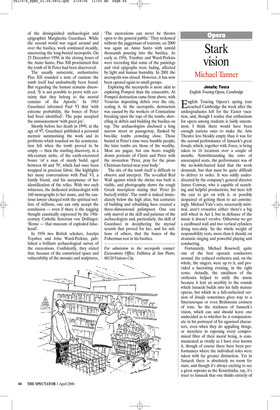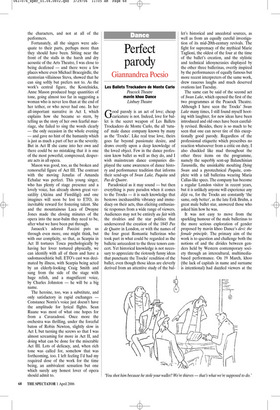Stark vision
Michael Tanner
Jenufa; Tosca
English Touring Opera, Cambridge
English Touring Opera’s spring tour reached Cambridge the week after the undergraduates left for the Easter vacation, and, though I realise that enthusiasm for opera among students is fairly uncommon, I think there would have been enough curious ones to make the Arts Theatre less bleakly empty than it was for the second performance of Janacek’s great Jenufa, which, together with Tosca, is being taken to 16 locations over a couple of months. Notwithstanding the rows of unoccupied seats, the performance was of the no-holds-barred kind that the work demands, but that must be quite difficult to deliver to order. It was oddly underdirected by the company’s general director James Conway, who is capable of searching and helpful productions, but here left the cast to get on with it, or possibly despaired of getting them to act convincingly. Michael Vale’s sets, necessarily minimal, aren’t evocative either: there’s a big mill wheel in Act I, but in defiance of the music it doesn’t revolve. Otherwise we get a cardboard wall and two vertical cylinders doing tree-duty. So the whole weight of responsibility rests, more than it should, on dramatic singing and powerful playing and conducting.
Fortunately, Michael Rosewell, quite one of the best operatic conductors around, the reduced orchestra and, on the whole, the singers, were up to it, and provided a lacerating evening, in the right sense. Actually, the smallness of the orchestra helped to unify the music because it lent an acerbity to the sounds which Janacek builds into his fully mature operas, but which in a full-orchestral version of Jenufa sometimes gives way to a Smetanesque or even Brahmsian cosiness of tone. So the starkness of Janacek’s vision, which can and should leave one undecided as to whether he is compassionate in his portrayal of his agonised characters, even when they do appalling things, or merciless in exposing every compromised fibre of their moral being, is communicated as vividly as I have ever known it, though of course there have been performances where the individual roles were taken with far greater distinction. Yet in Janacek there is absolutely no room for stars, and though it’s always exciting to see a great soprano as the Kostelnicka, say, it’s truer to Janacek that one thinks entirely of the characters, and not at all of the performers.
Fortunately, all the singers were adequate to their parts, perhaps more than they should have been. Sitting near the front of the stalls in the harsh and dry acoustic of the Arts Theatre, I was close to being deafened — and there were a few places where even Michael Bracegirdle, the stentorian villainous Steva, showed that he can sing softly but prefers not to. As the work’s central figure, the Kostelnicka, Anne Mason produced huge quantities of tone, going almost too far in suggesting a woman who is never less than at the end of her tether, or who never had one. In her all-important narrative in Act I, which explains how she became so stern, by telling us the story of her own fearful marriage, she failed to sing the words clearly — the only occasion in the whole evening — and gave no hint of the humanity which is just as much a part of her as the severity. But in Act II she came into her own and there could be no mistaking that it is one of the most powerful, compressed, desperate acts in all opera.
Mason was good, too, as the broken and remorseful figure of Act III. The contrast with the moving Jenufas of Amanda Echalaz was perfect. This young singer, who has plenty of stage presence and a lovely voice, has already shown great versatility (Alcina and Fiordiligi) and one imagines will soon be lost to ETO, its inevitable reward for fostering talent. She and the mountainous Laca of Dwayne Jones made the closing minutes of the opera into the near-balm they need to be, after what we have been put through.
Janacek’s adored Puccini puts us through even more, one might think, but with our complicity, so that, as Scarpia in Act II tortures Tosca psychologically by having her lover tortured physically, we can identify with all of them and have a sadomasochistic ball. ETO’s cast was decimated by illness, with Scarpia being acted by an elderly-looking Craig Smith and sung from the side of the stage with huge relish, and a magnificent voice, by Charles Johnston — he will be a big name.
The heroine, too, was a substitute, and only satisfactory in rapid exchanges Constance Norris’s voice just doesn’t have the amplitude for lyrical flights. Sean Ruane was most of what one hopes for from a Cavaradossi. Once more the orchestra was thrilling, under the forceful baton of Robin Newton, slightly slow in Act I, but turning the screws so that I was almost screaming for more in Act II, and doing what can be done for the miserable Act III. Lots of delicacy, and, when rich tone was called for, somehow that was forthcoming, too. I left feeling I’d had my required dose of the work for the time being, an ambivalent sensation but one which surely any honest lover of opera should admit to.



























































































 Previous page
Previous page